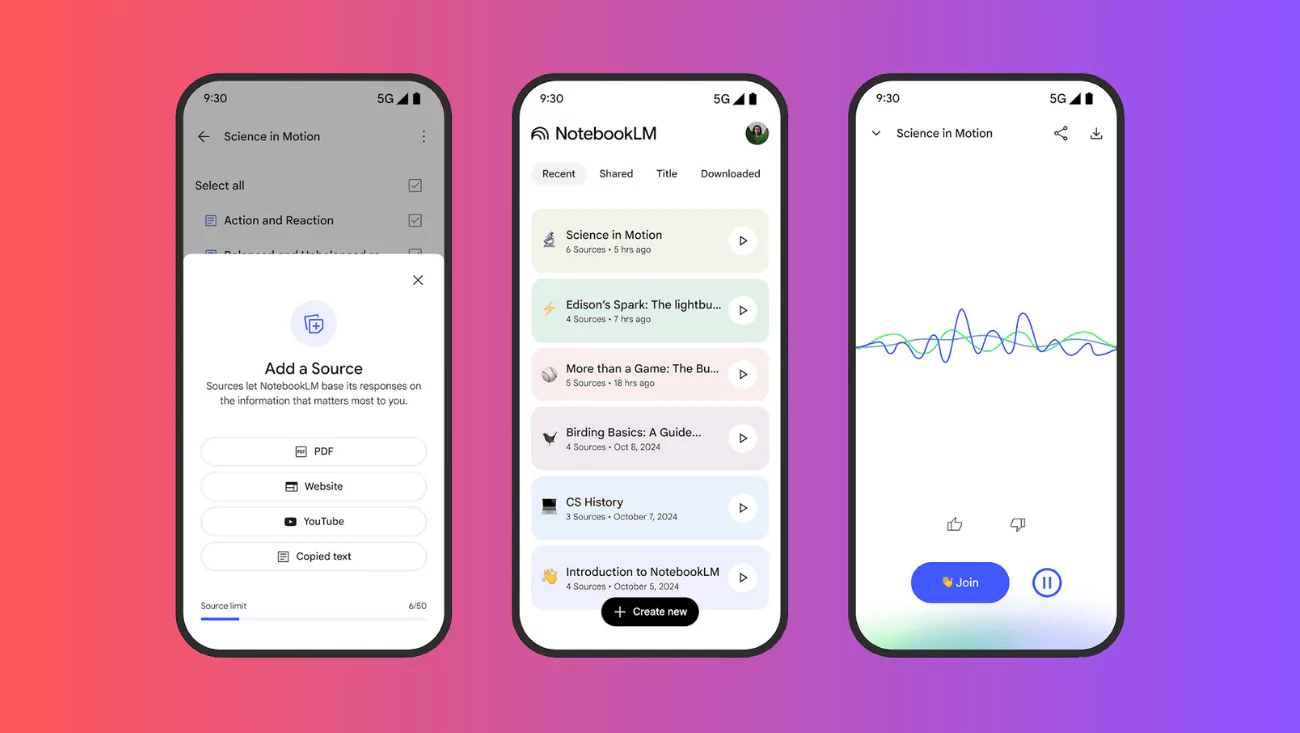May 1, 2025 – Google has revealed plans to release a standalone NotebookLM app for Android and iOS, marking a significant step in expanding its AI-driven research assistant to mobile platforms. Set for a beta launch on May 20, 2025, during Google I/O 2025, the app builds on the success of NotebookLM’s web version by integrating advanced features powered by the Gemini model, such as Audio Overviews and seamless source integration. This development positions NotebookLM as a strong contender in the productivity app market, offering users a robust tool for research, learning, and content creation directly from their mobile devices.
NotebookLM, originally launched in 2023 as “Project Tailwind,” uses AI to analyze documents, generate summaries, and provide insights from uploaded sources like PDFs, websites, and YouTube videos. A 9to5Google article outlined the app’s design, which features a streamlined interface with tabs for Recent, Shared, Title, and Downloaded notebooks, alongside a “Create new” floating action button for adding sources. The app introduces enhanced functionality, including offline support for Audio Overviews—a feature that transforms documents into podcast-style summaries—and background playback, allowing users to listen while multitasking. Additionally, the app integrates with the system share sheet, enabling users to add sources directly from other apps, making it a versatile tool for managing research on the go.
The NotebookLM app’s technical capabilities are a focal point of this release. A TechRadar article confirmed its beta launch date of May 20, 2025, via the iOS App Store listing, noting that the app supports up to 50 sources per notebook (or 300 for Pro users), with Gemini processing the content to deliver summaries, explanations, and interactive Q&A sessions. The Audio Overview feature, which has already amassed over 350 years of listening time on the web, now offers a full-screen player with a waveform display, allowing users to engage with AI hosts and ask follow-up questions during playback. This functionality leverages Gemini’s multimodal capabilities, enabling the app to handle text, audio, and potentially visual inputs, enhancing its utility for research workflows.
Technical Features and Capabilities
Here’s a breakdown of the app’s key features:
- Interface Design: Tabs for Recent, Shared, Title, and Downloaded, with a “Create new” button for source uploads.
- Audio Overviews: AI-generated podcast summaries with offline support and background playback.
- System Integration: Share sheet support for adding sources from other apps seamlessly.
- AI Capabilities: Powered by Gemini, supporting up to 50 sources (300 for Pro users) per notebook.
From a technical perspective, the NotebookLM app represents a leap forward in mobile AI applications. The integration of Gemini allows for real-time processing of complex datasets, such as academic papers or lengthy reports, with the AI synthesizing information into digestible formats like summaries or audio narrations. The offline support for Audio Overviews addresses a key user need—access to content without constant internet connectivity—while background playback ensures that users can engage with their research during other activities, such as commuting or exercising. For professionals and students, this means a more efficient research process, as they can interact with their materials in diverse contexts without being tethered to a desktop.
The app’s release also highlights Google’s strategic focus on AI-driven productivity tools, positioning NotebookLM as a competitor to established players like Notion, Evernote, and Microsoft OneNote, but with a distinct emphasis on AI integration. It was reported that the app’s tablet interface offers an expanded layout, optimizing the experience for larger screens by providing more space for source management and AI interactions. This design choice reflects Google’s aim to cater to a wide range of users, from students summarizing lecture notes to researchers compiling data for publications. The app’s ability to integrate with the system share sheet further enhances its utility, allowing users to quickly add sources from browsers or other apps, streamlining the content creation workflow.
The broader implications for the productivity app market are noteworthy. It was reported that Google’s decision to launch a standalone app, rather than relying on a Progressive Web App (PWA), responds to user demand for a native mobile experience, a need that became evident after earlier teases in April 2025. The beta launch may come with initial limitations, such as potential bugs or missing features, but Google’s commitment to refining NotebookLM based on user feedback suggests a long-term investment in this tool. As AI continues to transform how we work and learn, NotebookLM’s mobile app could set a new standard for research tools, encouraging competitors to integrate similar AI capabilities into their platforms, potentially reshaping the digital productivity landscape.
Google’s NotebookLM app for Android and iOS offers a technically sophisticated solution for users seeking to streamline their research and learning processes. By leveraging Gemini’s AI capabilities, the app delivers a seamless mobile experience that could redefine productivity on the go. As the beta launch approaches on May 20, users have an opportunity to explore how this tool can enhance their workflows. Have you used NotebookLM on the web, or are you looking forward to trying the app? What features are you most excited about? Share your thoughts in the comments—we’d love to hear how this app fits into your research and learning routine.







